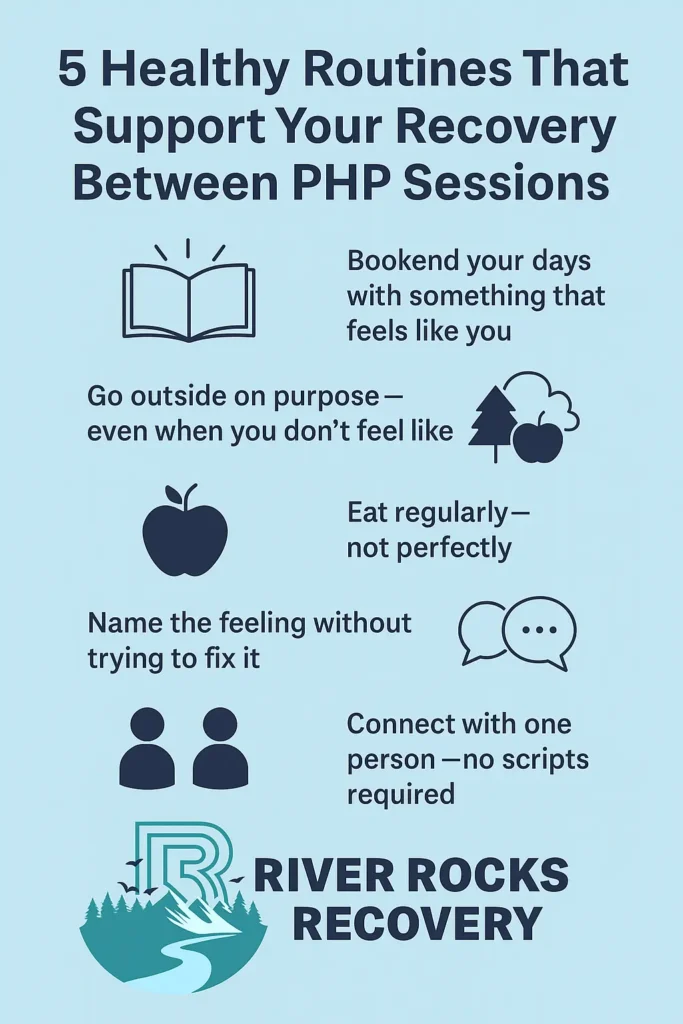When you’re young, sober, and somewhere in the middle of treatment, the time between Partial Hospitalization Program (PHP) sessions can get weird. You’ve got structure during the day—group therapy, check-ins, maybe a favorite counselor who actually gets you. But when you head home, the hours can feel stretched thin. Like you’re caught in the in-between: no longer numbing, not yet feeling “normal.”
This is especially true if your friends are still partying… or just don’t get what you’re doing. You might be wondering if this whole recovery thing is supposed to feel this lonely—or this awkward.
Here’s the truth: you’re not broken. You’re just in the middle. And that middle space needs care.
That’s where healthy routines come in—not as some Pinterest-perfect life plan, but as small, doable things that make the in-between days more bearable. More real. And maybe, slowly, more meaningful.
(And if you’re still figuring out if PHP is the right level of care for you, here’s a helpful look at our Partial Hospitalization Program in Middletown, Ohio.)
1. Bookend Your Days With Something That Feels Like You
Even if the rest of your day is chaos, your mornings and evenings can still be yours. Not perfect. Not Instagram-worthy. Just yours.
That might look like:
- Putting your phone down for the first 10 minutes after waking up
- Brushing your teeth while listening to music you actually like
- Saying one thing out loud at night that you’re proud of, even if it’s just “I didn’t ghost my session today”
This isn’t about adding pressure. It’s about adding permission. Permission to have a slow morning. Permission to end the day with honesty. Those bookends make the middle part a little less overwhelming.
2. Go Outside on Purpose—Even When You Don’t Feel Like It
We’re not saying “go outside and feel better instantly.” We’re saying: something shifts when you change your scenery. If your brain’s buzzing, if you’re spiraling, or even if you’re just stuck in that too-familiar nothingness, being outside helps.
Walk the same loop every day. Sit on the curb with a cup of coffee. Breathe in air that hasn’t been through a vent. Nature isn’t a cure—but it’s a reminder that the world is bigger than your current spiral.
If you’re looking for a Partial Hospitalization Program in West Chester, Ohio, know this: a lot of our clients find that even five minutes of movement between sessions helps them process and regroup.
3. Eat Regularly—Not Perfectly
Recovery takes energy. Your brain is literally rewiring. You don’t need a nutritionist to tell you that skipping meals or living off vending machine snacks messes with your focus, your mood, and your ability to show up.
But you don’t need to turn into a clean-eating guru either. A peanut butter sandwich counts. So does a frozen burrito. Eating something every 3–4 hours helps stabilize your blood sugar—and your emotions.
This matters more than you think. Not eating enough can look a lot like depression or anxiety. Sometimes, the simplest way to feel more grounded is to eat something warm and filling.
4. Name the Feeling Without Trying to Fix It
You don’t have to have deep emotional awareness all the time. But try this: when you’re off, pause and say (or write), “Right now, I feel ___.”
Confused? Bored? Restless? Sad for no reason? Cool.
The goal isn’t to solve it. The goal is to stop pretending it’s not there.
This tiny practice gives your emotions somewhere to go instead of bottling up. You can write it down, text it to a recovery friend, or just say it to your reflection while brushing your teeth.
Recovery isn’t about being happy all the time. It’s about learning how to stay present—even when it sucks a little.

5. Connect With One Person—No Scripts Required
The isolation in early sobriety is real. And not everyone you knew before treatment is going to be part of your after.
That doesn’t mean you need to rebuild your social life overnight. Start small:
- Text a friend a meme with zero context
- Join an online meeting or group chat—even if you don’t talk
- Ask someone in group if they want to walk out with you
Connection doesn’t have to be deep to be real. It just has to be honest. The point isn’t to impress anyone. It’s to remind yourself: you’re still part of the world.
And if you’re starting fresh in a new area and looking for a Partial Hospitalization Program near Monroe, Ohio, we can help you build those connections from day one—awkward small talk included.
Bonus: Let the Weirdness Be a Sign of Growth
Here’s the uncomfortable truth: the weirdness you’re feeling is probably a good sign. It means you’re not numbing anymore. You’re feeling stuff. Even if it’s confusing. Even if it’s boring. Even if it’s uncomfortable.
You’re not failing. You’re healing. And healing is weird.
Think of this like growing out a bad haircut. For a while, nothing feels right. It’s in your eyes, sticking out at weird angles, and you’re convinced you should just shave it off and start over. But give it a little time, and suddenly it starts to make sense.
Recovery is like that too.
FAQ: What to Know About Partial Hospitalization Program (PHP)
What is a Partial Hospitalization Program (PHP)?
A PHP is a structured, intensive level of treatment where you attend programming during the day (usually 5–6 hours) but return home or to supportive housing at night. It’s ideal if you need more support than outpatient therapy but don’t require 24/7 care.
How is PHP different from residential or inpatient treatment?
In inpatient care, you stay at the facility full-time. In PHP, you receive similar levels of clinical support during the day—but sleep in your own bed (or transitional housing). It offers more flexibility while still providing depth.
What do you do during a PHP day?
Each day typically includes group therapy, individual counseling, life skills, and psychoeducation. At River Rocks Recovery, we tailor PHP to your goals and healing pace. You’ll learn, connect, and get tools you can actually use outside.
Who is PHP for?
PHP is often a fit for people who:
- Are stepping down from inpatient or detox
- Need more structure than weekly therapy offers
- Want to stay sober but struggle in unstructured time
- Are dealing with co-occurring mental health challenges
What if I miss a day or need to take a break?
Life happens. We get it. While consistency matters, missing a day doesn’t mean you’ve failed. Talk to your treatment team. We’ll work with you—not against you.
Let’s Make the In-Between Less Lonely
If the hours between sessions are the hardest part, you’re not alone. Call 888-905-6281 or visit our PHP services page in Middletown, Ohio to learn how we can support you—not just during sessions, but in the messy, meaningful in-between.




























